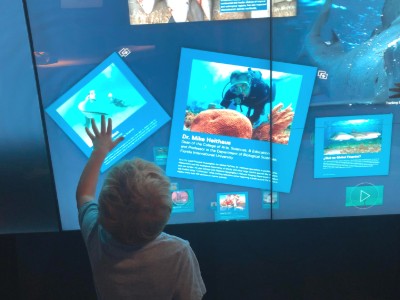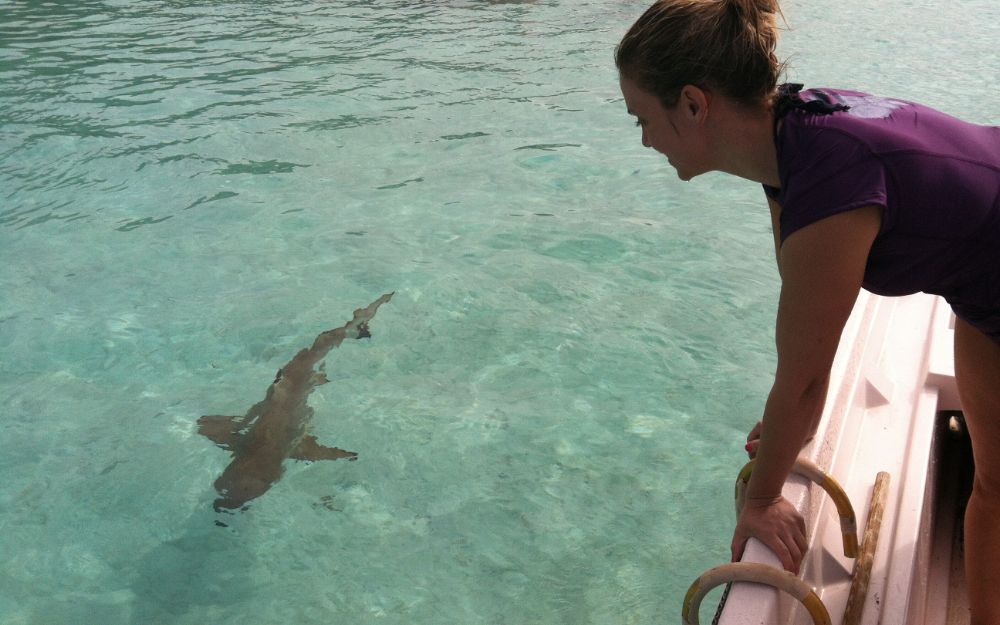Global FinPrint launched in 2015 as the first global survey of its kind, deploying baited remote underwater video systems (BRUVS) to record sharks, rays and other sea life on coral reefs. We usually set 30 to 100 BRUVS on a reef and record animal sightings for 60 minutes on each one. (Read our BRUVS Protocol for more information.) The data allow us to identify the factors that affect the number and types of sharks and rays seen across the entire survey. Understanding the most important factors that are related to human-activities, such as conservation actions or fishing activities, helps resource managers decide what needs to be done at a local or national level to better protect these animals.
A Paul G. Allen initiative led by researchers at Florida International University, we united an international team of more than 120 researchers focused on four key coral reef regions: the western Atlantic, the Indian Ocean, the Western Pacific and the Central Pacific. Our analyses have identified conservation actions that are most likely to help these animals, as well as the nations that have the highest conservation potential.
To date we've surveyed more than 400 reefs in 58 countries and territories, with over 20,000 hours of footage - Watch some of our highlights. The data - and the scientific adventure - will be shared through an open-access database created by Vulcan Inc., a Paul G. Allen company.
Our first global analysis, published in Nature, found that sharks were absent on nearly 20 percent of the reefs surveyed. Reef sharks were largely absent in several nations that exhibited high human population density and poor governance of marine resources, highlighting the importance of working with local people and governments to address root social and economic causes of overfishing. Opportunities for reef shark conservation remain in most places: National shark fishing bans ("Shark Sanctuaries"), fishing regulations, no-take marine protected areas and other approaches are being used successfully in different parts of the world to prevent reef shark extinctions. We are working with local researchers and resource managers to implement fishing regulations, protected areas and trade controls based on our findings. We also identified locations where reef sharks are still common that could seed the recovery of populations in other locations if conservation measures are implemented.
Why We Care
Recent estimates suggest that around 100 million sharks are taken each year for their fins and meat; many species have suffered severe declines due to unregulated fishing.
Although you may have heard about “finning” - the removal of fins from live sharks, with the sharks then being discarded at sea to die - you might be surprised that shark fishermen in most nations use the whole shark: fins, skins, cartilage, jaws, meat and all. The real problem is that without careful controls on how many are taken, this can exceed the ability of many shark species to replenish fished populations.
One-quarter of sharks and their relatives are threatened with extinction, according to the IUCN Red List of Threatened Species.
Loss of these predators threatens the food security of nations that rely on fish for human consumption and threatens the dive tourism industry that relies on sharks as living attractions.
Their absence can also disrupt the balance of marine food webs, causing large-scale habitat changes.
The next phase of our research seeks to improve our understanding of how sharks influence other reef animals and how the loss of sharks could disrupt the balance of coral reefs - the ‘rainforests of the sea’ - all over the world.
The Living Computers: Museum + Labs

The Living Computers: Museum + Labs in Seattle, Washington provides a one-of-a-kind, hands-on experience with computer technology from the 1960s to the present. Come in. Geek Out. Find us in the “Big Data” section, where you can dive into our work and discover what it’s like to analyze video data.
See what a baited remote underwater video frame looks like and enjoy a life-size shark model constructed entirely of smaller 3D-printed sharks and rays.
Phillip and Patricia Frost Museum of Science

The Phillip and Patricia Frost Museum of Science is a leading science museum dedicated to sharing the power of science, sparking wonder and investigation, and fueling innovation for the future. Located in Downtown Miami’s waterfront Museum Park, Frost Science is divided into four buildings, the Frost Planetarium, Aquarium, and North and West Wings.
You can find our exhibit in the Dive level of the Aquarium on the 3rd floor by the touch tank.
Aquarium of the Pacific

One of our BRUV watching hubs, the Aquarium of the Pacific now hosts an exhibit all about Global FinPrint. Visit the “Learning Lab” at Southern California’s largest aquarium.
With a mission to instill a sense of wonder, respect, and stewardship for the Pacific Ocean, its inhabitants, and ecosystems, we can’t think of a better place to learn more about our partnership and how we’ve teamed up with citizen scientists to analyze one of the largest shark and ray datasets in the world.

Learn About Our Findings
Explore where we've been working and what we've discovered about shark and ray populations.